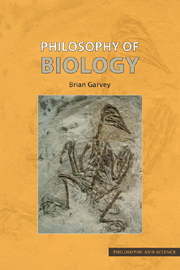Book contents
- Frontmatter
- Contents
- Acknowledgements
- Introduction
- 1 The argument in Darwin's Origin
- 2 The power of genes
- 3 Units of selection
- 4 Panglossianism and its discontents
- 5 The role of development
- 6 Nature and nurture
- 7 Function: “what it is for” versus “what it does”
- 8 Biological categories
- 9 Species and their special problems
- 10 Biology and philosophy of science
- 11 Evolution and epistemology
- 12 Evolution and religion
- 13 Evolution and human nature
- 14 Biology and ethics
- Notes
- Further reading
- Bibliography
- Index
5 - The role of development
- Frontmatter
- Contents
- Acknowledgements
- Introduction
- 1 The argument in Darwin's Origin
- 2 The power of genes
- 3 Units of selection
- 4 Panglossianism and its discontents
- 5 The role of development
- 6 Nature and nurture
- 7 Function: “what it is for” versus “what it does”
- 8 Biological categories
- 9 Species and their special problems
- 10 Biology and philosophy of science
- 11 Evolution and epistemology
- 12 Evolution and religion
- 13 Evolution and human nature
- 14 Biology and ethics
- Notes
- Further reading
- Bibliography
- Index
Summary
Although Darwin showed us how non-directed mechanical processes could produce design (or the appearance of design), he left a number of other related questions unanswered. He did not know what the mechanism of inheritance was, but the discovery of DNA seems to have pointed us in the right direction. But we are still left with at least one other question of comparable magnitude. Given that natural selection produces design, and DNA contains the “instructions” for building organisms, how are those instructions “read”? That is, how do we get from a single-celled zygote to an organism with billions of cells of enormously diverse structure and function? Just as Darwin provided the template for explaining how we get design, subsequent advances in developmental biology provide the template for explaining how organisms develop. How they do so will be the subject of part of this chapter. Following that I shall deal with evo-devo, a new theoretical approach in biology that explores the implications of development for evolution, and developmental systems theory, a recent philosophical view of biology. As we shall see, developmental systems theory takes facts about development and uses them to call into question the idea that genes contain the instructions for building an organism. Before all that, however, we shall take another brief excursus into nineteenth-century biology.
A nineteenth-century idea: recapitulation
Back in the days when people were fond of finding grand patterns in history, it was oft en suggested that history goes in cycles; yesterday’s discarded idea will be welcomed back into the fold tomorrow. A popular twist on this view is that the revived old idea will not be exactly same as the old version, but somehow to think that ideas change, not just because of the vagaries of fashion, but for good, rational, reasons. Ideas, we hope, are rejected because there are reasons to reject them. Th is means that if a discarded idea returns, it must be in some altered form that is able to withstand the criticisms that brought the original version down.
- Type
- Chapter
- Information
- Philosophy of Biology , pp. 64 - 88Publisher: Acumen PublishingPrint publication year: 2007



